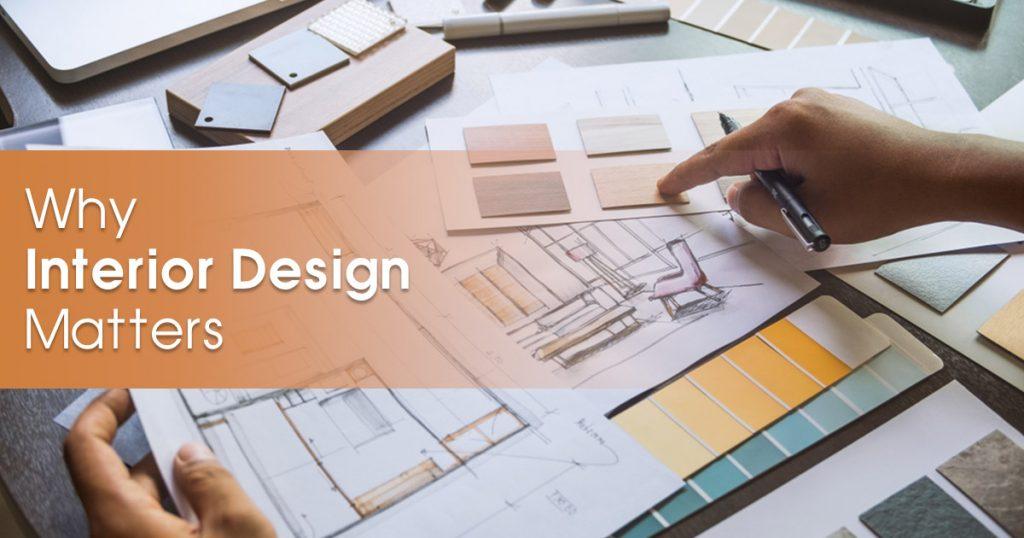Embarking on a journey into interior design opens the door to a world where spaces cease to be mere structures and become immersive environments that shape our experiences. At the intersection of aesthetics and functionality, interior design is a transformative art form, weaving together colors, textures, and furnishings to craft spaces that captivate the eye and enhance our daily lives. In this exploration, we will be delving into the significance of interior design as an enriching journey. This extensive exploration will uncover ten compelling reasons why interior design matters.
Here are some of the reasons why interior design matters:
1. Enhancing Aesthetic Appeal
Interior design, as a nuanced art form, goes beyond mere decoration; it is a transformative force that turns spaces into captivating environments. The meticulous selection of colors, textures, and furnishings is akin to orchestrating a symphony, contributing harmoniously to create an inviting atmosphere. A well-designed space is more than visually pleasing; it becomes a sensorial experience that captivates our senses, making it an indispensable, influential element in our surroundings and one of the importance of interior design.
2. Optimizing Functionality
While the aesthetic allure of interior design is undeniable, its impact extends deeply into functionality. Beyond the visual aspects and interior design importance, interior design plays a pivotal role in optimizing the practical use of space. Through thoughtful space planning and strategic furniture arrangement, every nook and cranny is infused with purpose. This functionality is not merely about convenience; it is a deliberate effort to enhance the efficiency of daily activities, solidifying interior design as a fundamental aspect of our practical living spaces.
3. Reflecting Personal Style
Another reason why interior design is important is that it serves as a canvas for self-expression, turning your living or working space into an embodiment of your personality. Each carefully chosen element creates a unique space, from furniture to color schemes. This infusion of personal style adds a layer of comfort and identity to your surroundings, establishing an emotional connection that fosters a sense of belonging and individuality.
4. Creating Emotional Connections
A well-designed space transcends the physical and has the power to evoke emotions and forge lasting impressions. As one of the importance of interior design, the strategic use of lighting and decor becomes a language that communicates with our emotions, influencing our mood and behavior. Interior design becomes a powerful tool for crafting environments that resonate with our feelings, enriching our daily experiences with a heightened sense of connection and well-being.
5. Boosting Property Value
The importance of interior design isn’t confined to personal satisfaction; it extends to real estate. Homes or businesses adorned with well-thought-out interior design often experience a tangible increase in property value. Potential buyers or clients are naturally drawn to spaces that marry aesthetic appeal with efficient design, positioning interior design not just as a creative endeavor but as a shrewd investment with measurable returns, thus emphasizing its importance in the competitive real estate landscape.
6. Improving Quality of Life
Living or working in a thoughtfully designed space contributes significantly to an improved quality of life. Beyond aesthetics, another interior design importance is that comfortable and well-designed surroundings have been linked to increased well-being, reduced stress levels, and enhanced overall satisfaction. Interior design becomes a catalyst for fostering a positive and enriching lifestyle, influencing our well-being in profound ways.
7. Maximizing Space Utilization
Interior designers are virtuosos in optimizing even the most compact spaces. Their expertise in layout and design allows for the effective utilization of available space, creating an illusion of openness while avoiding clutter. One of the reasons interior design matters is mastery of spatial organization enhances the functionality of a space, making it more enjoyable and efficient for its occupants and exemplifying how interior design is the key to making the most out of any space.
8. Keeping Up with Trends
Interior design is a dynamic field that constantly evolves with changing trends. Another reason why interior design is important is that it ensures that your space remains current and stylish. From modern minimalism to timeless elegance, staying attuned to design trends keeps your environment fresh and relevant. This adaptability to trends is an aspect of interior design that resonates with those who seek functional spaces that reflect the latest in fashion and design.
9. Enhancing Productivity in Workspaces
The design of a workspace plays a pivotal role in influencing productivity. Thoughtful placement of furniture, ergonomic considerations, and the incorporation of natural light create a conducive work environment. Interior design, therefore, becomes a strategic tool for enhancing the efficiency and productivity of workspaces, making it an invaluable asset in the professional realm where optimized environments directly impact the quality of work.
10. Fostering Sustainability
In an era of increasing environmental consciousness, interior design is a catalyst for fostering sustainability and one of the importance of interior de. From using eco-friendly materials to incorporating energy-efficient design principles, interior designers contribute to a greener future. This aspect of interior design aligns seamlessly with the global movement towards environmentally responsible living, underlining its relevance in shaping a more sustainable world and emphasizing its role in creating spaces that harmonize with the planet.
Understand Better Why is Interior Design Important!
In conclusion, interior design’s importance extends far beyond a space’s visual appeal. It is a multifaceted discipline that combines aesthetics with functionality, allowing individuals to tailor their environments to suit their needs and preferences. Whether for personal satisfaction, increased property value, or creating conducive workspaces, interior design is a cornerstone in shaping our places; understanding why interior design matters is the first step toward creating spaces that look good and enhance our overall well-being, making it an indispensable aspect of our daily lives.
